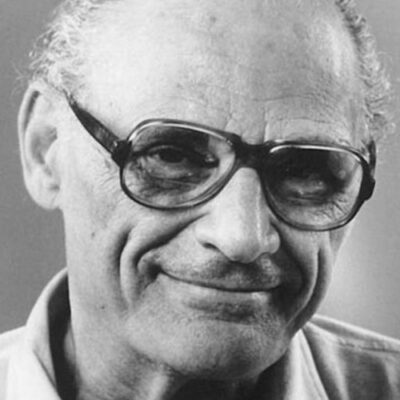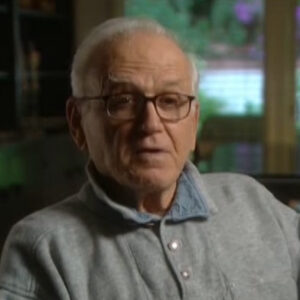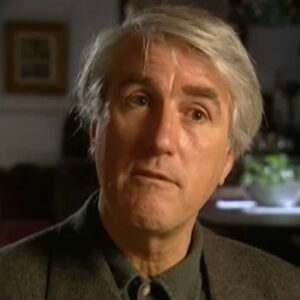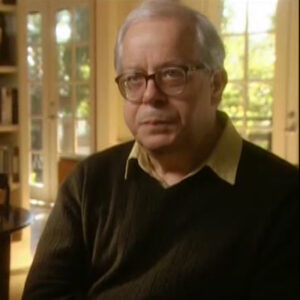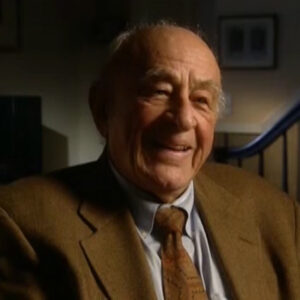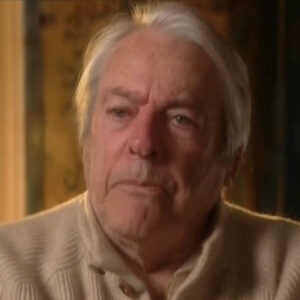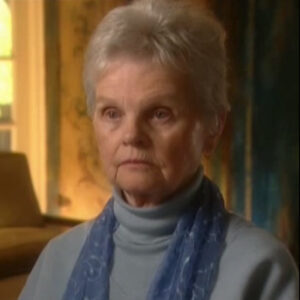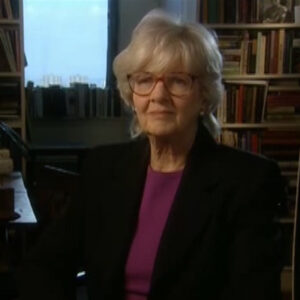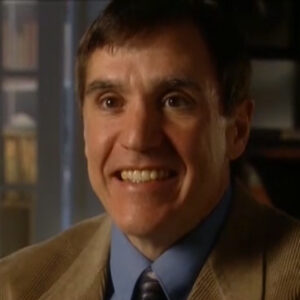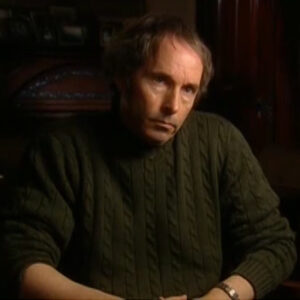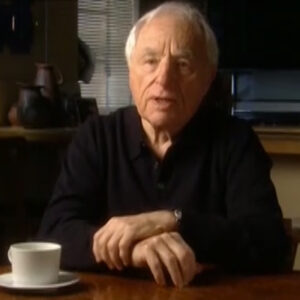Speaker Post Reagan and post-Cold War, you may not understand what is the attraction for people like Hasan formula to the Communist Party in the 30s. Were they supportive? That in the way that they’re labeled? OK.
Speaker The 1930s were the period of the Great Depression, and I think it was Lincoln Steffens who had been over to the Soviet Union and said he had seen the future and it worked. I’m not sure if it was Steffen’s could have been someone else. And a lot of people believe that. And they certainly believe capitalism wasn’t working. The Communist Party, among others, stood for the principle that you had to get a new economic system.
Speaker People were walking out of their door. What are they seeing? What are they feeling in the course of their own lives that are driving to that conclusion?
Speaker You know, it’s a country of many millions of people, so some people are jumping out the window. Other people are saying the bread line. Other people are saying people selling apples on the corner. Other people have lost their fortunes. Other people are seeing headlines about the loss of jobs. And, you know, Roosevelt was putting the New Deal into place. But there are a whole set of questions. So that was one issue, the economic issue, which is a critical issue. Secondly, there was the civil war in Spain. Civil war in Spain was a great symbolic activity that a lot of people saw as the forerunner to Hitler’s attempt to take over Europe. And as he put it, tomorrow, tomorrow the world, and especially in the Jewish community, there was a belief that, you know, you had to do everything you could to fight the Nazis. And this Spanish civil war was a place of first resistance.
Speaker Thirdly, this was a period when there was not only Jim Crow and segregation in this country, but and the poll tax where which was effectively a way of keeping Negroes as as black people were called at the time from voting. But there were lynchings throughout the South and the Communist Party was in the what they used to call the vanguard in a leadership role on all three of those issues. And then there were symbolic cases like the Scottsboro Boys who were falsely black kids, who were falsely accused of raping two white women. And other cases that they were rent strikes and other things going on. And the party was a leadership organization from the bottom up in its units throughout the country. Finally, in Hollywood, the party made a special effort to, as it called it, in the jargon of the day, seize the weapon of mass culture. And John Howard Lawson, who was one of the Hollywood ten, we can discuss who the Hollywood Ten were and what they came to. But John Howard Lawson, who is a major theoretician of the Communist Party and a Hollywood screenwriter, believed and wrote a book about movies as the next sort of mass culture medium. And so the party was interested in Hollywood for, in my view, for three reasons. One was it was a chance to seize the weapon of mass culture. Secondly, as more and more people there were attracted to the party’s message and went to party meetings, they could make use of their celebrities for public relations purposes and propaganda purposes. And thirdly, there was money out there and they the party was always broke and it was a good place to raise money. So even as people from the bottom up were attracted to the Communist Party, the party was attracted to people from the top down and the bottom up, either if they could provide bodies at the bottom.
Speaker And those are the three things of the top party for many people who saw a great deal of injustice at home and in the rise of fascism, I guess here as well, that. It seemed to be the only voice. It wasn’t that it was in some ways even the best voice for these people.
Speaker Yeah. Yeah. I don’t I don’t agree with that necessarily. I mean, I think that you had in the New Deal resurgence of the Democratic Party and a lot of energy and all kinds of bright young people going to Washington with the belief that they could make a difference. There was so-called hot dogs. These guys like Felix Frankfurter and Alger Hiss and Oliver Wendell Holmes as other clerks and all Dean Acheson and all these guys who thought that they could really make for a better world to come. And secondly, there they had programs like the the federal theater project and all kinds of arts programs that artists like Ben Shahn and other sort of Popular Front artists got involved in. There were alternatives. Well, I mean, Sean, I think probably brought to the party as well. But it wasn’t only the party. It was. Yeah. There was this period of the so-called Popular Front when party made alliances with the New Deal. And it also was very tied into the folk music movement. And they were smart enough to encourage the the these indigenous musical and theatrical and cinematic impulses and forms and folks and creative people. And you didn’t find this in the general culture out there. So there was an attraction. And, you know, the joke was, why did you join the party? I joined it to meet girls, as Lionel’s standard put it. Well, but it was a social movement as well as a political and cultural movement. It ran summer camps. It started schools. And it did encourage these other lively arts.
Speaker So we touched an enormous number of. Yes. So the popular image of the committee is that it was a product of the fact that it’s a product of the cold. Is that true?
Speaker Well, anticommunism started by some reckonings in this country way back when the Soviet Union was born after the Russian Revolution. And the the un-American Activities Committee came to Hollywood in the late 1940s. It had a life before that. It began by looking into the Klan and some other things. But it’s as Frank Donner, who is a scholar of that period, once said, it was as if the un-American activities went to Las Vegas and started putting money in the slot machine. And when they hit anticommunism, they hit the jackpot and they stopped there. And the people on this committee included people like John Rankin, who is a famous anti Semite, Jay Parnell Thomas, who was the chairman of the committee when they called their first ten witnesses, the so-called Hollywood Ten, who went to prison for refusing to answer their questions and who were cited for contempt of Congress. And Thomas himself eventually ended up in the same prison as someone. OK. OK. But but these these people. These. Yeah, sure.
Speaker Because I’ve heard that Vegas. Yeah. What does that mean that they’re putting in their quarter. If you can explain why he says that.
Speaker Well, I mean, I’m, I’m you should talk to Walter Goodman about the literal history of the committee. But, you know, they were, in theory, living up to their title of looking for un-American influences. And it’s part of the nativist impulse, as historians call it, in this country. If you don’t like it here. Go back where you came from. And the specific hearings that led to the investigation in Hollywood began looking into the content of motion pictures, not the backgrounds of the people. And when they didn’t find it there, they moved on to looking into the so-called subversive backgrounds of the people who they were interrogating.
Speaker Why didn’t they find the pictures? I mean, the Communist Party was like, why wasn’t there communist content in the movies?
Speaker First of all, the writers who were had probably the largest representation of party members in their unit out there had the least to say about what got into their movies. You know, someone once said Hollywood is the land of accommodation. And the writers were as accommodating as anyone else. But even if you put so-called propaganda in the films, it would be cut out as it went up the line to the producer, the executive producer, et cetera, et cetera. Secondly, here’s what they found. They found in a movie by Al the Bessey, who is one of the Hollywood ten. One of his characters whistled The Internationale while waiting for the elevator. It was probably improvised by. I think it was LANL standard. Who did that? I don’t know if it was in the script in and out the best movie. Someone pointed to a plane coming down, flying in. And this was during World War Two when Russia was our ally, saying it’s one of ours. And it was a Russian plane. The in Lillian Hellman’s movie, they showed smiling, happy communist chur chill in its faces.
Speaker The closest they ever came to identifying something that looked like really rank awful propaganda had to do with a film based on Ambassador Davies book Mission to Moscow. And the guy who made it. No one turned out not to be a communist. Howard Koch. And number two, he made it at the request of Franklin Delano Roosevelt, who is trying to make nice through our wartime allies, the Russians. And and so he encouraged them to make it. So they just subversive stuff. They didn’t find it there.
Speaker So they can’t find it there. So they just pack their bags and go home and say, well, we’re safe. Hollywood hasn’t been infiltrated by the communists.
Speaker There’s one more thing to say about that. There was a sense out there, and I know it was true, that there are a whole bunch of movies made in the nineteen thirties and four.
Speaker And until the Cold War came along early for the pre-war, that show capitalists as evil, stupid, grasping. People played by actors like the overweight Edward Arnold and others. And Mr. Smith goes to Washington. Being a great Frank Capra SC film. Frank Capra film about a Boy Scout type leader played by Jimmy Stewart who took on the evil, ugly capitalist. That’s different from communism and different from subversion is part of the American myth of the little guy, Jack and the Beanstalk. David and Goliath, the little guy taking on big power. And I think as they look into that, they just couldn’t find this conspiratorial or espionage element that the communist image stood for.
Speaker So what did they do? So in round one. What they did was which they had two major sets of hearings. One they took. They interviewed people like Adolf Monju, who is a very, you know, played the slick manager and the golden boy and played these kind of Hollywood smoothies.
Speaker But who was a member of the far right? And they took owners of the studios produces like one of the Warner Brothers and others. And they call them and they made sort of irresponsible charges of who was and wasn’t a communist, like Warner said of someone. Well, he sounds like a commie. I think he was started by Howard de Silva. The committee got in enough trouble as a result of that round of hearings that its next round. It made sure to call for the most part, they got some people wrong anyway. They subpoenaed 19 people. And for the most part, these were people on whom they had evidence that they were members of had been members of the Communist Party.
Speaker So they get back, back. Yes. So, you know a lot of horns today. Yeah, I. So they get paid. What value do they have of calling Ronald Reagan and Gary Cooper and. Jack Warner, I believe he may well. Well, what do they get for that?
Speaker The committee wanted to bask in the publicity glow of the people that they called. So the first value that members of the committee in American activity. This committee gets is publicity for themselves. They were opportunists. And secondly, they. These folks were symbols. The people who they were calling in terms of Gary Cooper, Ronald Reagan and those folks were symbols of of Americanism at its finest. And they were confused with the roles they played. And so they got the benefit of these good guys and they hope that they were going to identify the bad guys. It didn’t always happen.
Speaker We talk about them. I realize in a certain shorthand, we make the assumptions that it’s just about publicity. Is there nothing? At the core of the committee, forty 47 is about the genuine worry about the specter of communist.
Speaker You can’t psychoanalyze every member of the un-American Activities Committee and know what their motives were. There are undoubtedly people in the United States in that period who thought that there was an international red menace.
Speaker And and as time went on, when China went communist in the language of the day and the Russians got the bomb and Alger Hiss and the Rosenbergs were convicted, as it was called in the headlines, traitor to his country in the case of the Rosenbergs atom spies. And we went to war in Korea. The Cold War heated up. And this fear that the communists were going to undermine us at home as well as abroad became a real factor in national politics.
Speaker And this gave a new life and a second energy to the committee, which had sort of gone into hibernation. Between the period of 47 48, when they called the folks who became the Hollywood 10, the case worked its way up through the courts and the 10 men went to prison in the 51.
Speaker So. There he is, I think, for people, a real sense. Thank you so much. It’s not just it’s not right.
Speaker Well, if you ask me that, I believe I believe that there were people in and out of government who did believe that there was a genuine communist menace.
Speaker And that was the number one problem facing what they called the free world. However, the committee was in the worst position to make that case because by investigating Hollywood, there weren’t any.
Speaker They didn’t believe there were saboteurs or spies in Hollywood. They really didn’t. And some of them may have persuaded themselves that their country was going to be overthrown by virtue of the content of these movies. But they really did become disabused of that very early on. So to the extent that they believed in what they were doing, it was to me a great delusion.
Speaker I’ll just say it was, you know, those last series, the horns and Sirens. I don’t know what to do.
Speaker You know, I know that they’re cutting through authentic background. Yeah, exactly.
Speaker OK, so let’s just talk about. Do you think that somebody like J. Pernell Thomas is a fair man who is going to Hollywood to seek the truth?
Speaker Again, I want to ask you, in terms of what’s in his head, you know, the actions that he takes that you could assess.
Speaker The hearings. Were conducted in an overheated atmosphere, when you see newsreels of them today, you see witnesses who did not behave well. By the way, who spoke through the chairman wrapping his gavel on the desk when they could have shut up. When he asked them to be quiet. And they did. And so he had the right. And chairmen of committees have been known to do that, to declare people in contempt because they don’t follow orders from above. On the one hand on the other hand, they had an agenda going on that was pretty obvious. And it wasn’t to get these people to tell the truth. It was the tripped them up and make examples of them and eventually to indict him. I think they discovered it as they went along. Thomas himself is someone who went to prison for taking kickbacks from members of his own committee. So he compromised his own reputation with history independently of his conduct at the hearings.
Speaker Well, let’s go to this for a second. They call these 19. Yes. And you rightly point out. You rightly point out that the reason they call them is they know they have a card.
Speaker They believe them to have a car. They didn’t know, as it turns out. Well, 19. We’re not all 10. We had cards at one point in their history, as far as we know, to be a member.
Speaker What does the committee feel like? What kind of evidence is that?
Speaker The what happened to the 10 was that instead of answering the committee’s questions or instead of refusing to answer the committee’s questions under the Fifth Amendment, which protects your right not to incriminate yourself. The 10, as a matter of collective strategy, chose to do two things. Number one, first, to claim that they were answering the committee’s questions in their own way. And then in a confusing tactic to say their own way of answering it was not to answer it. And in effect, to invoke the first the First Amendment to the Constitution, the committee chair declared them in contempt. And when that went up in the courts, the court said, you don’t have the right not to answer their questions later on. Other witnesses took the Fifth Amendment and the court said you do have the right not to incriminate yourself. And so from that point forward, lawyers advised their clients, if you want to be safe and stay out of jail and stay out of prison. Take the Fifth Amendment.
Speaker And not like the ten didn’t. I’m not the First Amendment, which is what the 10 did.
Speaker Patient with their lawyers came to the conclusion they did not want to adopt the strategy, which some people urged on admitting they were communists, so some of them had been some them still work. They thought that were so stigmatized in terms of the political culture of the time that there was no percentage in doing that. And if they answered that question, some of them believe the next question would be who is a member of the party with you? And then there would be in the position of injuring others in order to save themselves. And their propaganda at the time didn’t admit they were communists and said that this is an attempt to wound the left and hurt the liberal left community so that they had an incentive not to answer the committee’s questions. The committee, if they could prove that they indeed were members of the Communist Party, then the committee thought it would be validated, in fact.
Speaker Of course, it was legal to be a communist at that time. But the the left internalized the attacks of their persecutors and they behaved as if they were guilty of something, even though they didn’t want to take the Fifth Amendment.
Speaker And this injured them in the greater scheme of things. And I think now, looking back, many people would say it was a mistake and tactic.
Speaker Maybe mindset.
Speaker What value does that have? It’s not illegal to be a member of the party. While in front of me, are you a member of the committees of the Congress, have two legitimate functions.
Speaker One is to amass information in order to write legislation, and the other is to monitor the executive branch of the government. They’re not supposed to monitor the popular culture and look for subversive influence in the popular culture.
Speaker But if they found evidence of communist infiltration in the popular culture, that makes headlines, that helps with constituents back home. That feeds into the Cold War hysteria which they were cashing in on politically and again and believe they were doing. Some of them believe they were doing God’s work.
Speaker So it was outside of what I would regard as their legitimate purview and was outside what their lawyers claimed. Was there a legitimate question asking permission? But they were they were prospecting for that communist gold and it would justify their existence.
Speaker They would argue it would justify their existence.
Speaker Yes. OK. So one of the things one of the other undercurrents that you’re talking about here is a measure of secrecy, not a measure of secrecy. Party card doesn’t seem like a.
Speaker What the party couldn’t wouldn’t allow people to remember the history of the Communist Party in this country was that it started out as a secret organization and it was persecuted and they were the Palmer raids where they rousted people out of their homes. And there were all these terrible things happen to come. So the communist adopted a strategy of secrecy that changed over time, and it varies from unit to unit. And there weren’t people, regardless of what the party’s policy was, who kept their party cards in their pockets and something to the laundry, who are open about their Communist Party membership. There are communists running candidates for president of the United States. And there were others who did not. And people who thought it would injure them in their work environment were secret communists.
Speaker And that they think hurt them.
Speaker There was a difference here, Jack.
Speaker Yeah, they were terrified of.
Speaker Popular response.
Speaker And again, there were weird and comical and farcical things that happened, a little grocer in Syracuse was able to get whole networks to not employ people by withdrawing his sponsorship from programs. The American Legion and the Catholic Legion of Decency, who picket lines around movie theaters. And Hollywood was in the public opinion game and they were scared. And whether they were whether they were justified in that fear is a whole other question. If one of them had stood up and had fought the system, I think the system might have gone under. If the trade unions had stood up. I think the system would have gone or didn’t if the press had done its job. I think the system might have gone under earlier than it did. But everyone went along. And for too long.
Speaker Actually, everybody on Hollywood rolls over for fear, not so much of the government in Hollywood as much as it is fear of.
Speaker American Legion war veterans. Well, that’s what is motivating the war.
Speaker The Wall Street community, which is bankrolling the films in Hollywood, got together after the 10 had behaved in what they regarded as an obstreperous way in refusing to answer the un-American activities questions. And after their meeting, a statement was made by Eric Johnston, the head of the Motion Picture Academy, that they would no longer employ anyone in Hollywood who did not cooperate with a duly authorized committee of the Congress. And that meant if you had been a communist to confess your own party membership and presumably you would then be asked about others and to name just as well what’s motivating them. They had a big investment in these movies and they didn’t want their investment to be lost, whether through popular condemnation of pictures condemning Australia’s communist directors and communist actors, or through a controversy surrounding movies that were supposed to bring people together. And whatever their fears, partly irrational hysteria. But but then there are people who just wanted to keep their jobs and couldn’t afford to have themselves be accused because they thought they would lose their jobs and would struggle to keep it low.
Speaker Don’t make any way.
Speaker Don’t don’t have picket lines outside. Don’t have a body. Boycott Warner Brothers picture.
Speaker So, you know, if anybody else that’s just moments in that period are complicated to desegregate, because the second question they asked of the ten had to do with union membership and they had been very ugly, violent and bitter disputes between the studios and their unions in the period just before the Klan were called. And so undoubtedly part. And people like John Howard Lawson, who were said to be the cultural commissar in Hollywood, was one of the founders of the Screenwriters Guild. So those things were all mixed up together. And it’s and it’s it is probably a disservice to history to do too much desegregation because people didn’t make those distinctions at the time. They just knew communism was evil, a danger or a threat. And we are going to resist it. And they know it’s bad for business. They thought they knew it was bad for business.
Speaker And I think, as you point out, it’s a little bit these guys are causing trouble in our perfect world that the studios have run and controlled. So much for so long. We’ve got a bunch of troublemakers now just to get rid of the trouble that’s been written about.
Speaker Help me understand, if you could, a political climate in Hollywood.
Speaker Which the hook is birthed into.
Speaker Is Hollywood receptive to a film about the corrupt union on the Brooklyn docks?
Speaker As far as I know, Hollywood, there’s no reason Hollywood wouldn’t be receptive to a film about corruption on the union docks other than if a particular union was upset about them making the film.
Speaker Years later, Bud Schaumberg said that he couldn’t make the movies he wanted to make about corruption in the trade union movement because of union resistance to it. And but put that aside for the moment, Arthur Miller and Kazan were collaborating on a film about the waterfront, and Miller again some years later said that his that the studio wanted him to change. The bad guys from corrupt hoodlums on the waterfront into corrupt communists caught front. And he didn’t want to do it. So he pulled out of the project.
Speaker Interestingly, Kazan and Bud Schulberg made the movie that became On the Waterfront, which I think was one of the great movies. And they weren’t corrupt communists. They were corrupt, a corrupt union leader.
Speaker I said, make you know, this is going to cause problems on the docks. And I’m going to give it to the FBI. That. And it seems absurd to me that a movie mogul is going to give a screenplay by surprise and I write to the FBI to ask if it’s OK to make this.
Speaker No, I I don’t know enough about what what was normal and not normal Hollywood.
Speaker I do know, however, that one of the kind of unintended consequences of the collaboration of the movie industry and the government during World War Two to make films that were going to help the war effort, was a series of relationships with the FBI, among others, and other agencies of the government that carried forward into the post-war period so that these folks knew each other and they wanted to help each other. And Hoover was a had created in the FBI force that represented the force that represented what appeared to be absolute ultimate power. And he used it to advantage. And you did not want to be on the wrong side of Hoover if there was anything in your life that could cause you embarrassment, whether it was private sex stuff or public political stuff.
Speaker He was in some ways his own.
Speaker He whoever it was, Gale, dealing with the FBI was like dealing with a foreign country.
Speaker So then could do to get subpoena.
Speaker Do you think has any ambivalence on Kazantsev part about either the committee or the party? I mean, what goes to not, say, ascribing tickets and what goes through the mind of somebody that gets the pink slip that says you’re being called before the House un-American?
Speaker I mean, it’s very hard to generalize about what goes through the minds of people who were killed in that period.
Speaker I would imagine the first thing that goes through is a ripple of fear. It’s going to hurt my family. It’s going to hurt me. It’s going to make it difficult for me to carry on with my work and my art and my calling. And then you’re confronted with the political problem, assuming that you had been involved with the communist movement in the past. Do I? I don’t. I cooperate with them. And in the case of Kisan, I think, yeah, he had very ambivalent feelings about it because he felt very bitter about his party experience. He had no ambivalence about that. He felt that they had abused him when he was a member of the party, that they had abused their own relationship to the group theatre that he was in.
Speaker And that’s good. I’ll rephrase the question just to give you a. I apologize for interrupting, but going gonna eat you up completely. How do you know? How does he feel about the Communist Party? By the time he’s speaking, he’s still a party member. Is he still Kisan was subpoenaed.
Speaker He had a bitterness towards the Communist Party. Was bidding towards the party because he felt that when he was a member for about a year and a half in the 30s, they behaved in an anti-democratic and bullying way. They tried to organize a subchapter in the group theatre in a secret way that would vote against Democratic.
Speaker That would violate democratic decision making processes. And in particular, personally, they wanted him to, as he wants to put it, crawl on his knees and abjectly cave in to something they wanted him to do that he didn’t want to do. So he felt that they were an anti-democratic force, although he still was what I guess these days we would call a liberal Democrat in his soul. He was no longer involved with the communist movement and he was bitter about it.
Speaker Is it just personal for president or is he also looking at world events and seeing things through a different light? We’ve know had style impact.
Speaker We’ve had.
Speaker Some of the purges, some of the. Who lives where stuff is starting to get noticed, but affecting his aunt’s opinion in all of the party?
Speaker I think Kisan, like a lot of other people in the post war world. Came to see things about the Soviet Union that he didn’t hadn’t seen before and came to have beliefs about bad that he hadn’t had before, and they were influenced by the purge trials that were influenced by the Korean War.
Speaker And I think he bought into the sort of Cold War notion of the world divided into the so-called free world and the totalitarian, international monolithic communist conspiracy. He’s more sophisticated than most people. And part of his gift as a director and a creative person was to use the personal to dramatize the political. And I think those things were confused in his mind, maybe confused, constructively confused in his mind.
Speaker So good. You get the easy choice, you know.
Speaker Well, if you take him at his word and I do. It was not an easy choice. It was a very difficult choice. And he said difficult choices, one which causes pain no matter which way you go. And he said, you know, to name names to be an informer is a disgusting thing to do. And you’d rather not do that. On the other hand, he claims that he felt it was his obligation to do so. When you weigh that against the obligation to fight totalitarianism and the way to do that is with democratic openness there. I think he deluded himself so well. I think that he had plenty of opportunities to fight against totalitarianism without going through the ritual of strengthening a committee which was fundamentally a wrecking expedition by naming and causing problems for people who had joined the Communist Party, as he did for socially idealistic reasons. And so he saved his own career at the expense of others. But in Cezanne’s case, it was more than that, because he not only did that, he took an ad in The New York Times and Variety, the trade paper, urging others to do likewise. And, you know, he had this capacity and and maybe impersonality personality which required him once he chose a side, he became the leader of the troops and he wanted to do in his public statements. He showed no ambivalence whatsoever, in fact, which he said that people had an obligation to do what he was doing privately and subsequently in his own memoir. Later on and through the years, he has talked about his own ambivalence about it, although he also said probably if he had it to do again, knowing what he knew then and what it probably he might have done the same thing.
Speaker It’s interesting because there seems to be you know, he talks about not being able to sleep and eating too much.
Speaker I mean, he seems to be really, truly racked by the decision and feels as though there is no good way to go. But publicly, The New York Times and Variety article.
Speaker Are free, unaware of any ambivalence at all. Yes. And it seems to me that one of the things that infuriates people about the Times piece is that it gives.
Speaker Public measure of validity to the. But one of the things that holds out a separate isn’t just that he named names.
Speaker Well, they were I mean, Kisan had the following situation, number one, he was believed to be the most powerful director in the country and who could work on Broadway. And, you know, he had directed Miller’s plays.
Speaker He directed Tennessee Williams play directly, Thornton Wilder’s play. And and the Blacklist didn’t exist on Broadway the way it existed in Hollywood. So people felt that if there was anyone who could stand up to the committee, it was Kisan and Cassandre reputation as a fighter. So they were looking for him to resist. And it took him a couple of behind the scenes meetings, apparently, before he made his final decision about what he was going to do. And so I think people sort of blamed him for his strength. And when he came in and how could they resist if he could? And then he took the ad in the paper as well, which was the the thing that became unforgivable. And then there were rumors about that he did that he had a special deal going with scoring’s, who said who sign him to a contract and will break it if he doesn’t sign and all that. And there are people who believe that he did it so that he can work in Hollywood. He wanted to make movies. And indeed, for a few years he made some great movies. After that, he did make On the Waterfront after that. And he made face in the crowd. And I believe and he ironically, years later, he abandoned the movies to write novels and made a big deal about he could say what he wanted to say from his novels. And he didn’t care about movies. Not prove to people who said he did it because he wanted to work in Hollywood were wrong.
Speaker So his career. Yes. Let’s go back to the 50s, because one of the few things is this is not just somebody he could have worked in Hollywood I worked in.
Speaker If he had forgone his career and told the committee to go screw itself.
Speaker But that is telling the committee in not in the fund.
Speaker He could have broken the blacklist. Such a powerful protest. Do you buy that argument? Does that argument hold water for you?
Speaker You know, these historical counterfactuals, if Kazan had resisted, he could’ve singlehandedly broken the blacklist. We can’t know what you can. I personally believe that.
Speaker No, if that’s all that happened, the blacklist wouldn’t. On the other hand, if that.
Speaker What do you mean?
Speaker Well, if he resisted and no one else followed his path, things would have taken the route that they took. But, for example, you know, there are chain reactions and you can’t know what the chain reaction might have been.
Speaker For example, Marisol Attell wrote an article in The New York Times when the Lincoln Center started its new repertory theater.
Speaker I think you’re right, because I don’t want to. Okay. Yeah. Okay. Just feel the pressure. Yeah. Okay. On the waterfront here, OK? It’s hard to pass it up. Yeah, yeah. But before. Right.
Speaker Yeah. I believe that nowhere in Kisan were a. Unique collaborative team. And that happens very rarely in history. And they wanted to continue their collaboration. I think the hook led to On the Waterfront and view from the bridge. Two very different and great dramatic presentations.
Speaker Let me go back for a minute to Crisan naming names. Do you think in naming names that he thinks he’s going to be able to hold on to his relationship? Dr. Miller?
Speaker Do I think in naming names when he named names?
Speaker He doesn’t think. Does he make any. Hold on.
Speaker You know, they had this long walk in the woods before.
Speaker Kazan gave his final testimony. Miller told him not to do it. Told them he would regret it for the rest of his life. And he did it in spite of that. Sure. I think a part of him might have hoped that he could continue the direct Miller’s plays. But I think when you do something like that, you don’t know what’s going to happen. And that he. So I think he took the risk. But. He probably hoped it would all work out for the best. I think, ironically, you know, he thought everybody would forget it in due course. And in fact, that’s the one thing people remember about him. They remember other things about him as well. But it’s the main thing. People remember it better.
Speaker That decision has overwhelmed almost.
Speaker Well, for for certainly for the people who lived through it, those who were on the other side will always see him through that lens. On the other hand, generations that know only from on the waterfront. And having seen some of his other tree grows in Brooklyn and some of his other powerful movies, East of Eden, they won’t know about this and couldn’t care less about it. And the the demonstration outside of the academy when he got his award is probably a fair example of where it is now. In other words, you’ve got probably fewer than 100 people out there carrying placards and you had the whole establishment inside and a handful didn’t get up for him. And a larger a few score didn’t applaud.
Speaker But, you know, there were others ranging from people who disagreed with what he did, like Warren Beatty and folks like that whose career he helped launch. You have a lot of respect for his talents and gifts and the rest of his life. So it’s it’s not that it obliterates him. It’s there alongside of it.
Speaker Inescapable. Yes. OK. Let’s go to.
Speaker On the waterfront.
Speaker How is it then that Bush Schulberg is working on a Hoboken script? Why turns a bad shoulder of shoulder has never been in Cezannes life before. Why not stick with Arthur Miller and try to get a waterfront script?
Speaker Again, there’s a. Specific historical narrative, which I’m not privy to, which you probably are.
Speaker Which one? Yeah. People. Yeah. Yeah. For his actions. Right. I mean. No.
Speaker But I’m saying I don’t know. Like, normally in Hollywood what happens is if one person drops off on her project, as Miller did, because they tried to get him to turn the other lives into communism. No, he didn’t want any part of that. The studio may say, all right, we’ve got a great guy for you. Who’s been writing this series for the Saturday Evening Post. But Schobert, talk to him, see if you guys can get together. I don’t know how it happened, but that’s the way I would imagine my image. Hollywood works. That’s the way I imagined it happened.
Speaker I think it would have to travel in the same circles. And a guy who is like you. I mean, Miller, camaraderie.
Speaker Silver Star. Yes. Why? Okay.
Speaker Well, I have no idea why he and Mutchilba got together as it happened. He Schaumberg and Lee Jay Cobb, all of whom were on this project together, had in common that they had social conscience and they all named names before the un-American Activities Committee. And it wasn’t easy for any of them. And in the case of Kazaam and Tilburg, they are probably among the most articulate exponents of why they why they felt they they should do what they did. No matter how ambivalent Kazaam was about it. And I found Cobbe not to be a when he was just penniless in his denunciation of his life. What he did, he just I don’t think the rest of them were any better than I am. So if they wanted me to resist them, give the eulogy at my funeral.
Speaker So let’s look into the actual meat as it is. Does this film any good? Is it too much about.
Speaker I think On the Waterfront is a very powerful movie. It’s a very effective movie in its own terms.
Speaker I think the dilemma that Terry Malloy, played by Marlon Brando faces, whether or not to. Cooperate with the waterfront commission, which in my view is a stand in for the un-American Activities Committee, was effectively portrayed in the movie.
Speaker I think to the extent that there is a subliminal pull this back so I can get you to go.
Speaker What is let’s talk about this film first. What is the drama of John Terry’s life?
Speaker Is he in another life?
Speaker He might have been a contender for a boxing championship. His brother sold him out on that one. He felt he hangs out with hoodlums on the waterfront.
Speaker He’s got a tender side to him, shown by the fact he takes care of pigeons on the rooftop and he is in love with a young woman who wants to bring out the better side of him. And along comes the waterfront commission that wants to clean up the commission, take away the conditions that prevented him from becoming a fighter before. And his choice is. And they kill his brother.
Speaker That’s OK. You’re OK. Yes. His brother is just a regular dock worker like him.
Speaker His brother is tied in with the mob and played by Rod Steiger. But he blames his brother for what happened to him. And, you know, my theory is, if if they were going to make a movie that gave him the ultimate dilemma, it would have been either he cooperates with the commission, in which case is his brother suffers death or whatever terrible thing is going to happen to him.
Speaker If it works in your life. Yes. That’s right.
Speaker Well, his brother is now dead. So.
Speaker Yeah, I’m going to I’ll go there.
Speaker If they wanted to make it, give him the dilemma that witnesses before the committee had done. Yes. That would have been a melodramatic and dramatic way.
Speaker OK. OK.
Speaker If this was if if you wanted to carry the analogy all the way through, the most powerful dilemma that he would have faced would have been if he cooperated, he would have had to name his brother. If Terry Malloy cooperated, he would have had to name his brother, played by Rod Steiger in the movie. That was not his choice in the movie. The movie, the choice the movie gave and his brother was already dead was Go with the Good Guys. The Waterfront Commission that stand for law and order or with in and go along with Johnny Friendly, played by the cigar chomping Liggio cop, and go along with this crooked way where you sell out your values. And and that this popular idea of the waterfront, the ethic that aspired to be an informer, turns out to be wrong. Informing can be beautiful. It can be the right thing to do.
Speaker And it’s it’s. And that was the message that the movie as it was shown.
Speaker In fact, I think what you’re saying is that by Johnny Friendly, chilling. Steiger’s character by the brother die. It actually becomes a moral imperative to inform. There’s no choice but to. Is that fair? In the course of the movie, you say, well, the movie is.
Speaker Yeah. I mean, the movie.
Speaker Makes it a heroic act for Terry Malloy, labor to inform.
Speaker Says, that’s me, you know, in this book. And he did the right thing, doesn’t hold water.
Speaker Yeah, I mean, I have to say I’m a little uncomfortable being that reductionist about any about any work. Yes. Back about opportunity, about any work of art. But and I think On the waterfront is better than to pass it that way as the exclusive thing about it.
Speaker And again, you have the director, you’ve got the writer, you got the actor and all that. However. Yeah, that that the imperative. Does it make sense that Kazaam thought he was playing Moloi? You know, I think that’s one of those retrospective things.
Speaker He wrote one thing. He said something a little different to me. SCHULBERG Sense of something a little different. So, yeah, he would like to think that he took on the mob and that he that he did a heroic thing by naming names against the popular idea that the people who named names were the courageous people he believes in the circles in which he traveled.
Speaker It was a courageous thing for him to name names.
Speaker To give you an opportunity to about over one of the things that he remarks about because in his memoir and the fact that he tried to do this film simply through it. Justification for naming names.
Speaker He said, look, I spent time on the job, these guys were being harassed in a way that was showing that the priests were saying, get up and talk to a waterfront commission, which did exist, and that was trying to give these guys a union back.
Speaker But he says this is a film in the tradition of Steinbeck’s Grapes of Wrath. It’s a film about the little guy. This is my I stay true to my voice.
Speaker This is about social justice. It’s an and it’s now a lefty film is not being seen as reactionary. Right. What do you say to Silver?
Speaker I think she’ll Berg is telling the truth as he sees it.
Speaker And I mean, it’s totally destructive. I guess what I’m saying, not so much to not to analyze Shulman’s comment, but yes, it is a truism in watch over me.
Speaker I think, Shorebird, to the extent that Schoenberg’s message is he saw corruption on the docks. He wrote a film about it and he portrayed it as accurately as he knew how. That’s fair. That’s what I think. I think he lacked some self-awareness. And when he said, you know, he would rather not have testified. But you want to fight the real evil, but had the opportunity to do that through Saturday review of literature and all the other outlets he had, he needn’t have strengthened the committee and gone through that ritual. Well, he did that.
Speaker So one of the great ironies of silver. Yes. Yes. On the waterfront is not doesn’t have the language, right? No.
Speaker You know, I think on the waterfront, this is very strong. Yeah. It is a very progressive movie. But it also has this other fact about it, which is the the case for informing. And it’s the answer to the simplistic liberal idea that somehow if you inform your automatically evil, you see the other side of it. You can inform and be courageous. That’s what they say. But they want you to think that then you transferred to the extent that they want you to think you transfer to them and then they become heroes. That’s the question mark. And was that going on? And Schoenberg’s mind at the time he made it? He says no. Was that going on in Cezannes mind at the time? He says in a half way some of it was going on. Was that going on in Cobb’s mind when when he when he made the movie? Who knows? Because Cobb is bitterly self abrogating when he talks about it. And was that goal in mind in a in a Braxton’s mind? Who did the music for it? I believe he name names. Did Bernstein do old music or. Excellent. Okay. I take it out.
Speaker Dr. Miller. Just for one. Yes, I’m sure. Do you think that the crucible that is a fair criticism of America. One of the. No. Yes.
Speaker I think the Crucible had a power resonance in the McCarthy period.
Speaker And the criticism that there were no witches with there were communists is misplaced because the idea was that to be a communist was to be a witch, in effect, was to be an espionage agent and the communist.
Speaker Or to be a saboteur. And the people who joined the Communist Party that were singled out by the un-American Activities Committee, especially in Hollywood investigations, were people who joined in to fight fascism and the depression and racism not. And they were not saboteurs and espionage agents.
Speaker So that the crucible, it seemed to me, tapped into this dynamic.
Speaker When a society is caught in the clutches of a great fear.
Speaker And it’s one of the reasons that I think it’s Arthur Miller’s most produced plays around the world because it taps into a similar dynamic in China and in the former Soviet Union and in England.
Speaker And they’re not analogizing to the McCarthy period. But I think it did something security. Yes. Yes, I think there is.
Speaker You about one of the interesting things about. Four short years and it’s a totally different world. How is America and 56 different from America and fifty two Miller and Kisan in. Well.
Speaker The Korean War is over, in effect. Big difference. Khrushchev has made his speech to the twentieth party Congress.
Speaker The McCarthy is. On his last legs and the heat is off.
Speaker The blacklist, however, is still in place and it’s winding down. And so it was an act of special courage on Miller’s part. It seems to me not only to do resist the committee, but not to invoke the ritualistic Fifth Amendment, but to risk an additional risk prison time by invoking the First Amendment and which is what he did. And in the end, he got off on a technicality and he didn’t go to jail. But but the times had changed.
Speaker One interesting thing about the changes Miller suggested on the floor, yes, he is willing, almost eager talks enormous amount when he answers questions.
Speaker With a proper decorum that the Hollywood Ten Review and the Hollywood 10 or maybe more stuff for us, but a. Yes, and so you have no right to ask me who I associate with, what I believe, what membership I belong to, what petition I sign.
Speaker And Miller is saying, I’ll answer any question put before me about myself.
Speaker Is that show the first part of my question? It seems to me that the committee has changed the nature of what is acceptable in America.
Speaker Well, I don’t think the committee was the prime mover in determining what was acceptable in America. I think that the progress of events here had the Hungarian revolution and you’d had a whole set of. Well, I can. That can. Yes. Question. The world had changed. Korean War is over. It’s such a number one. Number two, the legal situation had been clarified.
Speaker Ten didn’t. We’re entering the unknown. They didn’t know that the courts were going to rule. They thought they were gonna get off. By the way, the two justices died while their case was working its way up. Murphy and Rutledge and the courts decided that the Fifth Amendment was the safe way to go. That changed the dynamic of the committee and its witnesses. There was a new chair of the committee. By the time Miller was called Representative Walters in Pennsylvania, who was a sort of patrician and who had a daughter at Sarah Lawrence College and who asked if he could have his picture taken with Miller and Marilyn Monroe, it was a different time. And so you’ve got to factor that in. And and nevertheless, I think Miller did something important, symbolic resistance when he refused to cooperate.
Speaker You know, it’s interesting because, I mean, he has more room is. You know, I was criticized by some.
Speaker I don’t share this criticism, by the way, but people said he conducted it like a college seminar. Lillian Hellman said of him, you know, he said he’d been to hell and back and seen the devil and she’s anything went to hell he must have done as a tourist. And there were jokes made by people on the left say he could have been a more fierce resistance. Those go to moral style. And I don’t think Arthur Miller has to answer to anybody on questions of moral style because he’s such a superb articulator on the issues that are at stake. And when they tried to blame him for the Russians putting on his plays, he said, you know, that’s like blaming General Motors for who rides in their Cadillacs.
Speaker And he didn’t write his play to change the McCarthy thing any more than he worked out of his sales, much to improve the life of traveling salesman.
Speaker Know he’s trying to deal with deeper, more fundamental issues. Now, Miller himself may have denial propensities when he says that he didn’t do after the fall, that Marilyn Monroe had nothing to do with it. Well, you know, standing on the outside, it looks like she sure as hell inspired it.
Speaker And the same way that the McCarthy years is so inspired, the Crucible and the informer’s situation inspired view from the bridge. I think he denies those things, but that’s his stances to talk about them the way he talked about them before the committee.
Speaker I think it’s a good thing that is working.
Speaker Milliron, Kisan, had a dream of a national repertory theater independently when it came together, and they were both invited to be part of it. I think each of them, whether they know it or not, knew in some part of their soul each knew what some part of his soul that they hadn’t had the success. Subsequent to working together that they had had when they worked together, it hadn’t happened again on Broadway, certainly. And so they miss that. I think they missed each other. And so they welcomed this opportunity in Miller’s case, with whatever qualms he might have had, because in this case, I think he welcomed the period.
Speaker Others had problems with it. Jim Proctor, who had worked with Miller as a PR guy for many years, stopped talking to him over there where he thought he shouldn’t have done it. But that’s you know, there’s a symbolic politics. Things play out. Now they’re onto the next thing and then they might after the fall. It’s very ironic because it was an autobiographically inspired play, whether or not it was an autobiographical play. And Kisan ended up directing a character who is based partly on it seemed to be based partly on him, certainly a character who informed and cooperated with the committee. And then Kisan ended up marrying the the in real life, the woman, Barbara Loden, who is playing the character, who seemed to be inspired by Marilyn Monroe. So it is a novelist dream and it’s too, too neat to be true. But it was true.
Speaker So who knows what you know, of course, in the course of our film, like The Mousetrap, isn’t it?
Speaker Yes, yes. Yes.
Speaker What is the nature then? If I can get out. I mean, there were people like. You know, people like.
Speaker Who were.
Speaker Angry, incredulous at Nora’s decision. What? What is it about Kisan?
Speaker Do they feel that way about Miller’s decision to try to work on the car? Yes. What is it about?
Speaker I don’t know. I mean, first of all, you have to go back to that time.
Speaker And and I was going to say before Sam Xyloto in The New York Times, in talking about their working together, said they had difficulties in the past. I wouldn’t even say out loud what the difficulties when. So there still was this thing about the blacklist. It never there was never a national catharsis over the consequences of McCarthyism and the particular transactions before the un-American Activities Committee. So people never had a chance to work out all these conflicting emotions, guilt and free-floating moral questions which were all entangled together. And part of it, I think, fed into the resentment of people who were going to make it back. The one thing I think that people who objected to Kisan had over him was that he had done this bad thing. And then to have Miller, who who who stood for the opposite principle, work with him in a way, said, well, maybe wasn’t so bad after all, and that people who had had their lives ruined by it couldn’t abide. And but that’s when you get into the realm of symbolic politics. And it’s very hard to figure out why people have these different reactions to other people’s activities.
Speaker You know, one of the ironies about the is it comes out and actually criticized Miller for being former mayor of. OK.
Speaker This is the popular image now you survived, but Hugh survived. And I think technically it’s name survived into the 70s and they went out and about seventy five. Seventy six. But it petered out. It lost its power to inspire fear. And by the 60s, Abbie Hoffman, who was called before the committee in connection with this film Operation Abolition, I think appeared before the money with Jerry Rubin. And one of them showed up in a Santa Claus suit when Hoffman was who was sentenced for contempt of Congress. He wore a American flag t shirt. And it was ripped that where he was going through the crowds. And when he was asked if he had any words to say on his behalf, he said, I regret that I have but one shirt to give for my country. So they lasted out of business in the end. But you couldn’t have done that that easily. I think in the at the height of the Cold War. So, I mean, you’d like to think you could.
Speaker So who acts like you talk about it? Is it simply too. Yeah.
Speaker No, I think Hugh Act symbolizes not just you. There was the Senate Internal Security Committee. There was a subversive activities control board. There were a little red squads and every police department, municipal police department in the country. There was there was the FBI. There was the CIA. So you had this vast network of intelligence and inquisitorial agencies and police agencies. And one man, J. Go over for virtually all of that period, presided over Ippy. And under it. And alongside it. Behind the scenes. And we still don’t know the damage that that he and they have. Right. There were precedents for intrusions on liberty that were said that have to do with immigration policy, that have to do with First Amendment law, that have to do with the conduct of congressional committees that are with us to this day.
Speaker And that that come up in the context of how to respond to what happened at the World Trade Center. And I think we’re still working out what the legacy of this of those bodies is.
Speaker I think. In terms of what is permissible?
Speaker Well, I, I like to think that the Hollywood Ten and Sam and Miller and Sieger and some of the others showed us that it is possible to resist and prevail and thereby make it much more difficult for it ever to happen again in certainly in the way that it happened then with a congressional committee calling people up and they robotically came to the committee’s demands.
Speaker I think that can’t happen again. Also, the press, I think, learned from the press, learned during Watergate what it did was during the McCarthy years. It really has to fulfill its its mission and report on incursions on civil liberty when it season.
Speaker OK, I know that Dalton Trumbo croak, actually. Put it under your focus is the first time I’ve seen the whole thing, all of it without exception, and he just felt compelled to say things he did not want to say. Do you think Trumbo is right, that it’s pointless?
Speaker I think what Dalton Trumbo said in those of you who are too young to have lived through this should study the period. And when you do, please come back.
Speaker Keep in mind that that don’t look for heroes and villains and that we’re all victims. I think he did that in a spirit of great generosity. And there is a fundamental and important moral truth in what he had to say.
Speaker I think, however, that Albert Morse’s criticism of that. That to say that to members of the 10 Adrian Scott to take Adrian Scott and design or Sam or Dimitri, who ended up naming names, I’d say they’re equally victims, is to take away the meanings of our lives, the meaning of our lives. It’s to say that the guard and the prisoner at the concentration camps were both equally victim. There is a truth in what he has to say. And it’s not for me to or people who didn’t go through it to know what. To me, that is a debate of moral style that they’re they’re grappling with what the right thing to do is in that period. And it seems to me that you I would like to think about myself, that I would resist at that point, and that as the years passed, I would try to understand what led other people who were unable to resist or didn’t to do what they did and to make a distinction among them. Some of them were under terrible pressures and those of them cavalierly sacrificed their their former comrades to their own for their own benefit. And there are differences. And you really have to look at them case by case.
Speaker One of the things you say.
Speaker Well, that’s what Trumbo said. He said no. But but she used to say that by other people. So, again, you have to. That’s why I think it’s not it’s missing.
Speaker Kisan is a victim in a different way than say. And Scott as a victim is a different way than Malta. Oh, absolutely.
Speaker But they’re all victimized by a committee and by a system that seems utterly callous and unconstitutional. I mean, if there are villains, are they not the people that sat on that committee or the mobiles that ran the blacklist?
Speaker Well, sure. But again, you know, if you knew the detail of each other, you may come to different conclusions about the way different ones are to be.
Speaker But sure, you know, when I first went and interviewed.
Speaker Trumbo, I gave him the statement Mauls, gave me denouncing his only victim speech and and Trumbo looked at it and I said, What do you think about this? He read it. He said. Fok, Albert Morales, and then two weeks later, he called me at home and he said, Listen, I you know, I think I said something I shouldn’t have said. He said. Do me a favor and leave it out. It’s the committee we should be aiming at there that they’re the ones who we shouldn’t be pissing on each other and they’re the ones who are the villains in this piece. And sure, they were, but they were the agents, arguably, from the March’s point of view, they were the agents of the state. And it wasn’t just the committee. It was the FBI collaborating behind the scenes with the committee. It was all the other committees. It was the red squads. It was the whole apparatus, which is an expression of this political hysteria. And one of the reasons they were able to function was that the organizations and institutions that are supposed to be the guardians of liberty weren’t doing their job in that period.
Speaker The American civil liberties wasn’t doing its job. The Americans for Democratic Action weren’t the Jewish the American Jewish Committee wasn’t the Catholic Legion, you know, all of them down the road and the press wasn’t and the trade unions weren’t, in my opinion.
Speaker So it’s just a circle and a cycle of letting down our democratic values. And we all have to share where they all have to share in the blame for that.
Speaker On that, no, we will stop and ask for a couple seconds of sound after the surance and with your shirt. OK.
Speaker Have you talked to him? Kazam? He’s not he’s not there.
Speaker He’s OK.

